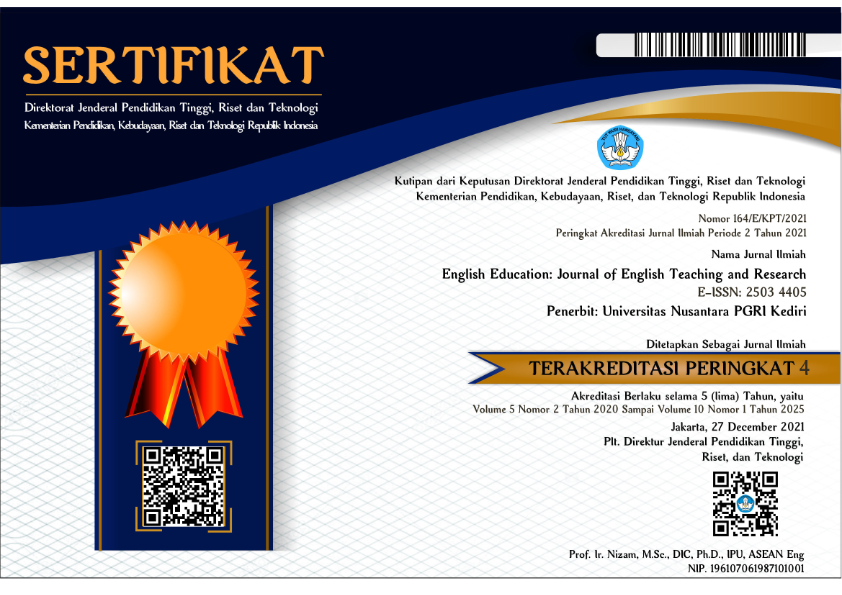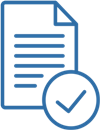The Correlation Between Self-Regulated Learning Strategies in Writing and Senior High School Students’ Writing Performance
DOI:
https://doi.org/10.29407/jetar.v10i2.26392Keywords:
EFL Writing, Self-Regulated Learning Strategies, Writing PerformanceAbstract
The objectives of the research were to identify the components of self-regulated learning (SRL) strategies used by high school students in writing performance and to investigate the correlation between self-regulated learning strategies in writing and students’ writing performance among senior high school students. The study employed a quantitative correlational design, with data collected from 126 tenth-grade students who were selected using convenience sampling. To examine students’ writing strategies, the researchers utilized the Writing Strategies for Self-Regulated Learning Questionnaire (WSSRLQ). The instrument demonstrated a high level of internal consistency, as indicated by Cronbach’s alpha coefficient of 0.895. Descriptive statistical analysis revealed that students primarily employed metacognitive and cognitive strategies at a high level, while social-behavioral and motivational strategies were used to a moderate extent. A very strong positive correlation was found (Spearman’s ρ = .849, p < .01) with motivational strategies showing the strongest correlation among the other components. In conclusion, the findings confirm a very strong and significant correlation between SRL strategies and students’ writing performance, with motivational strategies showing the strongest correlation. These findings highlight the importance of integrating SRL focused instruction into EFL writing pedagogy to improve student engagement, autonomy, and writing proficiency. This result contributes to future academic inquiry by offering a basis for further exploration of SRL strategies in diverse EFL writing contexts.
Downloads
References
Amalia, N. Z., Lestari, L. A., & Anam, S. (2023). The Correlation between Students’ Self-Regulated Learning Strategies and their Writing Ability in Argumentative Writing Class. International Journal of Pedagogy and Teacher Education, 7(2), 131. https://doi.org/10.20961/ijpte.v7i2.89318
Bai, B., Wang, J., & Zhou, H. (2022). An intervention study to improve primary school students’ self-regulated strategy use in English writing through e-learning in Hong Kong. Computer Assisted Language Learning, 35(9), 2265–2290. https://doi.org/10.1080/09588221.2020.1871030
Booth Olson, C., Maamuujav, U., Steiss, J., & Chung, H. (2023). Examining the Impact of a Cognitive Strategies Approach on the Argument Writing of Mainstreamed English Learners in Secondary School. Written Communication, 40(2), 373–416. https://doi.org/10.1177/07410883221148724
Cohen, L., Manion, L., & Morrison, K. (2007). Research Methods in Education. New York, NY: Routledge. https://doi.org/10.4324/9780203029053
Creswell, J. W. (2012). Educational Research: planning, conducting, and evaluating quantitative and qualitative research. Boston, MA: Pearson Education.
Guo, Y., Xu, J., & Liu, X. (2018). English language learners’ use of self-regulatory strategies for foreign language anxiety in China. System, 76, 49–61. https://doi.org/10.1016/j.system.2018.05.001
Harris, K. R., Graham, S., MacArthur, C. A., Reid, R., & Mason, L. H. (2015). Self-Regulated Learning Processes and Children’s Writing. Handbook of Self-Regulation of Learning and Performance. Routledge. https://doi.org/10.4324/9780203839010.ch12
Kirszner, L. , & M. S. R. (2018). Patterns for College Writing . Boston: Bedford/St. Martin’s.
Mohammadi, R. R., Saeidi, M., & Ahangari, S. (2020). Self-regulated learning instruction and the relationships among self-regulation, reading comprehension and reading problem solving: PLS-SEM approach. Cogent Education, 7(1). https://doi.org/10.1080/2331186X.2020.1746105
Oshima, Alice., & Hogue, Ann. (2007). Introduction to academic writing. Level 3. New York: Pearson/Longman.
Oxford, R. L. (1990). Language Learning Strategies: What Every Teacher Should Know. Boston: Heinle & Heinle Publishers.
Ramadhanti, D., & Yanda, D. P. (2021). Students’ Metacognitive Awareness and Its Impact on Writing Skill. International Journal of Language Education, 5(3), 193. https://doi.org/10.26858/ijole.v5i3.18978
Rebecca L. Oxford. (2013). Teaching and Researching Language Learning Strategies. London: Routledge.
Shen, B., & Bai, B. (2024). Chinese university students’ self-regulated writing strategy use and EFL writing performance: influences of self-efficacy, gender, and major. Applied Linguistics Review, 15(1), 161–188. https://doi.org/10.1515/applirev-2020-0103
Sun, T., & Wang, C. (2020). College students’ writing self-efficacy and writing self-regulated learning strategies in learning English as a foreign language. System, 90, 102221. https://doi.org/10.1016/j.system.2020.102221
Teng, L. S., & Zhang, L. J. (2016). A Questionnaire‐Based Validation of Multidimensional Models of Self‐Regulated Learning Strategies. The Modern Language Journal, 100(3), 674–701. https://doi.org/10.1111/modl.12339
Teng, L. S., & Zhang, L. J. (2018). Effects of motivational regulation strategies on writing performance: a mediation model of self-regulated learning of writing in English as a second/foreign language. Metacognition and Learning, 13(2), 213–240. https://doi.org/10.1007/s11409-017-9171-4
Teng, L. S., & Zhang, L. J. (2020). Empowering learners in the second/foreign language classroom: Can self-regulated learning strategies-based writing instruction make a difference? Journal of Second Language Writing, 48, 100701. https://doi.org/10.1016/j.jslw.2019.100701
Qin, L., & Jun Zhang, L. (2019). English as a foreign language writers’ metacognitive strategy knowledge of writing and their writing performance in multimedia environments. Journal of Writing Research, 11(vol. 11 issue 2), 393–413. https://doi.org/10.17239/jowr-2019.11.02.06
Umamah, A., & Cahyono, B. Y. (2020). Indonesian university students’ self-regulated writing (SRW) strategies in writing expository essays. Indonesian Journal of Applied Linguistics, 10(1), 25–35. https://doi.org/10.17509/IJAL.V10I1.24958
Wilbers, S. (2007). Keys to Great Writing. Cincinnati: Writer’s Digest Books.
Zimmerman, B. J. (2000). Attaining self-regulation: A social cognitive perspective. In M. Boekaerts, P. R. Pintrich, & M. Zeidner (Eds.), Handbook of self-regulation (pp. 13–39). San Diego, CA: Academic Press.
Zimmerman, B. J. (2002). Becoming a self-regulated learner: An overview. Theory into Practice, 41(2), 64–70. https://doi.org/10.1207/s15430421tip4102_2
Zimmerman, B. J., & Schunk, D. H. (Eds.). (2011). Handbook of self-regulation of learning and performance. New York, NY: Routledge
Downloads
Published
Issue
Section
License
Copyright (c) 2025 Rosary Nugraeni, Suvi Akhiriyah

This work is licensed under a Creative Commons Attribution-ShareAlike 4.0 International License.
Authors who publish with this journal agree to the following terms:
- Copyright on any article is retained by the author(s).
- The author grants the journal, the right of first publication with the work simultaneously licensed under a Creative Commons Attribution License that allows others to share the work with an acknowledgment of the work’s authorship and initial publication in this journal.
- Authors are able to enter into separate, additional contractual arrangements for the non-exclusive distribution of the journal’s published version of the work (e.g., post it to an institutional repository or publish it in a book), with an acknowledgment of its initial publication in this journal.
- Authors are permitted and encouraged to post their work online (e.g., in institutional repositories or on their website) prior to and during the submission process, as it can lead to productive exchanges, as well as earlier and greater citation of published work.
- The article and any associated published material is distributed under the Creative Commons Attribution-ShareAlike 4.0 International License








 Article template
Article template



